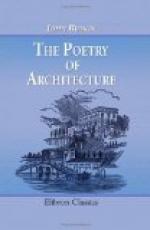94. Such are the great divisions under which country and rural buildings may be comprehended; but there are intermediate conditions, in which modified forms of the cottage are applicable; and it frequently happens that country which, considered in the abstract, would fall under one of these classes, possesses, owing to its peculiar climate or associations, a very different character. Italy, for instance, is blue country; yet it has not the least resemblance to English blue country. We have paid particular attention to wood; first, because we had not, in any previous paper, considered what was beautiful in a forest cottage; and secondly, because in such districts there is generally much more influence exercised by proprietors over their tenantry, than in populous and cultivated districts; and our English park scenery, though exquisitely beautiful, is sometimes, we think, a little monotonous, from the want of this very feature.
95. And now, farewell to the cottage, and, with it, to the humility of natural scenery. We are sorry to leave it; not that we have any idea of living in a cottage, as a comfortable thing; not that we prefer mud to marble, or deal to mahogany; but that, with it, we leave much of what is most beautiful of earth, the low and bee-inhabited scenery, which is full of quiet and prideless emotion, of such calmness as we can imagine prevailing over our earth when it was new in heaven. We are going into higher walks of architecture, where we shall find a less close connection established between the building and the soil on which it stands, or the air with which it is surrounded, but a closer connection with the character of its inhabitant. We shall have less to do with natural feeling, and more with human passion; we are coming out of stillness into turbulence, out of seclusion into the multitude, out of the wilderness into the world.
PART II.
The Villa.
THE MOUNTAIN VILLA: LAGO DI COMO:
THE LOWLAND VILLA:—ENGLAND:
THE BRITISH VILLA: PRINCIPLES OF COMPOSITION.
I.
THE MOUNTAIN VILLA—LAGO DI COMO.
96. In all arts or sciences, before we can determine what is just or beautiful in a group, we must ascertain what is desirable in the parts which compose it, separately considered; and therefore it will be most advantageous in the present case, to keep out of the village and the city, until we have searched hill and dale for examples of isolated buildings. This mode of considering the subject is also agreeable to the feelings, as the transition from the higher orders of solitary edifices, to groups of associated edifices, is not so sudden or startling, as that from nature’s most humble peace, to man’s most turbulent pride.
We have contemplated the rural dwelling of the peasant; let us next consider the ruralized domicile of the gentleman: and here, as before, we shall first determine what is theoretically beautiful, and then observe how far our expectations are fulfilled in individual buildings. But a few preliminary observations are necessary.




